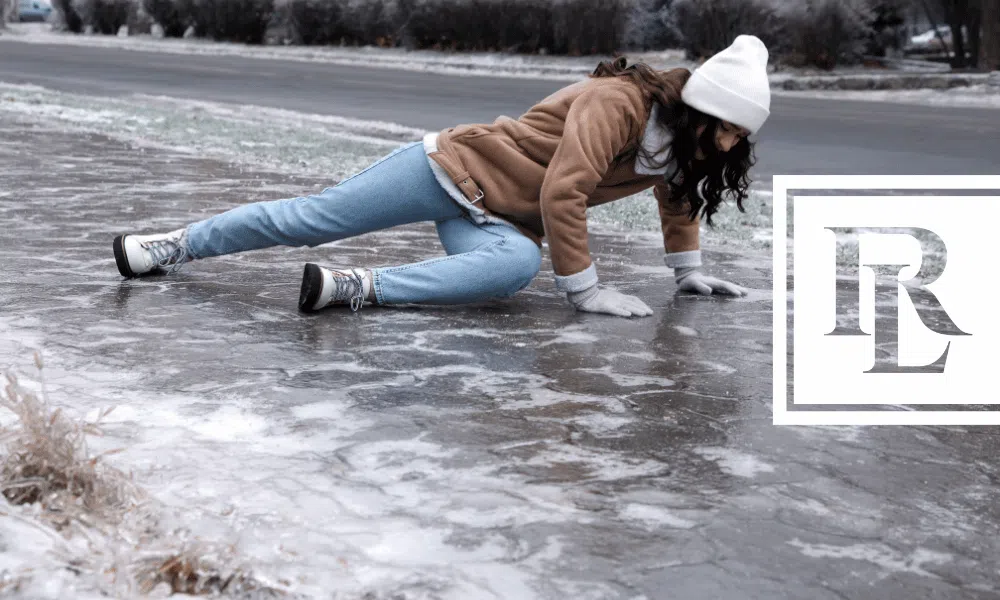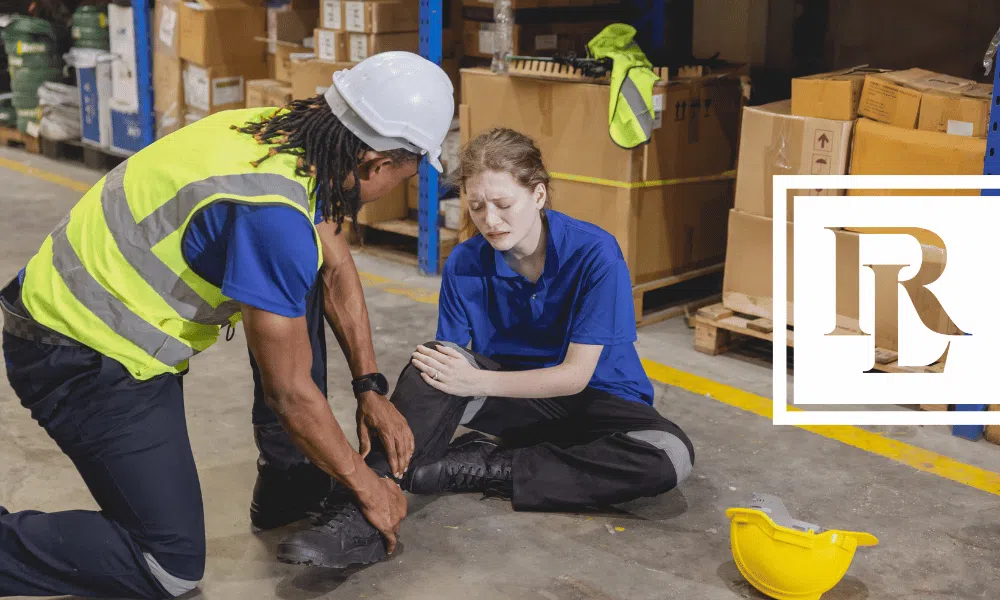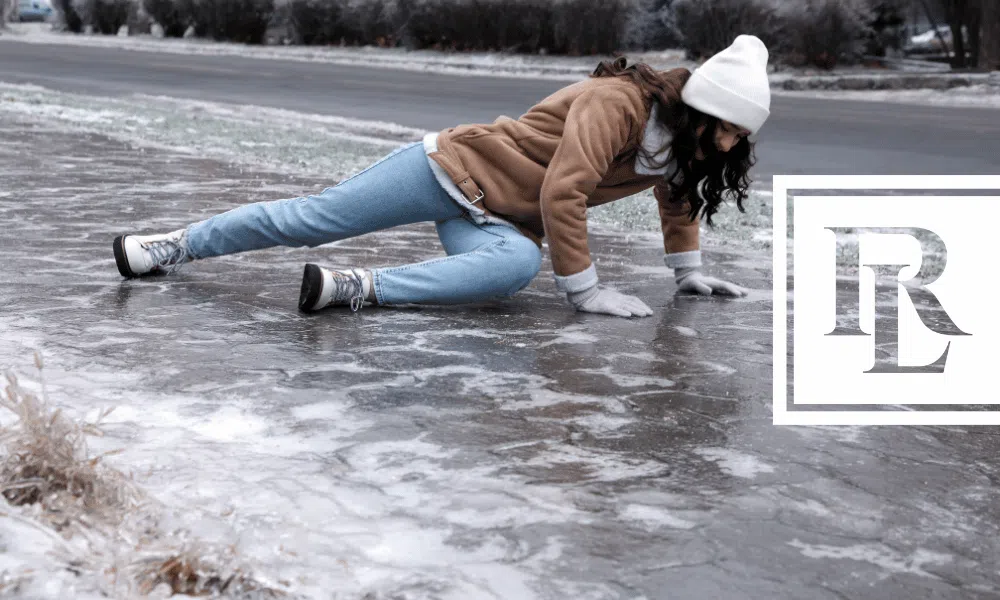Slip and Fall Accident Lawyer in New England
Slip and fall accidents can lead to serious injuries, including broken bones, spinal cord damage, and even traumatic brain injuries. These injuries often result in expensive medical bills, lost wages, and long-term suffering. At Rob Levine Law, we understand the challenges you face, and we are here to help. We provide aggressive legal representation to ensure property owners, businesses, and insurance companies are held accountable for their negligence.
Available 24/7 | Win or No Fees®
Home » New England Slip and Fall Lawyer
Legally Reviewed by:
Last Updated:
February 5, 2026
Table of Contents
- Why You Need an Experienced Slip and Fall Accident Lawyer
- What to Do After a Slip and Fall Accident
- Common Causes of Slip and Fall Accidents
- How We Can Help You Win Your Case
- Determining Fault in a Slip and Fall Case
- Why Rob Levine Law Is the Right Choice
- Contact Us for a Free Consultation
- FAQs About Slip and Fall Claims
"Having a lawyer, even if you weren’t at fault for the accident, is always really beneficial because it helps you to maximize your compensation."
– Delany Grune
Delaney Grune is driven by a passion for dispute resolution and helping others navigate conflict. She earned her Bachelor’s degree in Psychology and Criminal Justice from Northeastern University, and attended Suffolk University Law School.
Personal Injury Attorney

Why You Need an Experienced Slip and Fall Accident Lawyer
If you or a loved one has been injured in a slip and fall accident, we understand how overwhelming and painful it can be. At Rob Levine Law, we are here to help you navigate this difficult time. Our experienced team of personal injury attorneys is dedicated to fighting for the justice and compensation you deserve. With over 25 years of experience, we have successfully represented thousands of clients across New England, securing over $2 billion in compensation for injury victims. Whether in Rhode Island, Massachusetts, Connecticut, or New Hampshire, our team is ready to advocate for your rights with compassion, strength, and the proven results you need.
With our No Fee Unless You Win approach, you don’t have to worry about upfront costs. You only pay if you win your case. We have helped over 50,000 people across New England secure compensation for their injuries, and we are ready to fight for you just as we did for:
$330,000
- Slip and Fall Accident
Client fell on poorly maintained stairs on Hazard Court in New Bedford. Lost conciousness when the fall happened. Was rushed to St. Lukes, but the injuries, including internal bleeding of the brain were so severe they rushed him to Boston Medical Center where the client was in ICU for several days.
Attorney on Case
$150,000
- Slip and Fall Accident
Client was visiting a nursing home in Middletown RI. While bringing flowers to her family member she slipped and fell in a puddle of water. Long term pain management and pain injections.
Attorney on Case
$45,000
- Slip and Fall Accident
Client was walking his dog in the Burger King parking lot, when he slipped and fell on oil/grease leaking from the dumpster. His injuires were to his hip, and hands, including numbness in several fingers.
Attorney on Case
What to Do After a Slip and Fall Accident
After a slip and fall accident, it is important to act quickly to protect your rights and begin the process of seeking compensation. Here are a few steps to follow:
- Seek Medical Attention: Your health and safety should always come first. Get checked out by a health care provider, even if your injuries seem minor.
- Document the Scene: If possible, take photos of the accident scene, including any hazardous conditions that caused the fall, such as wet floors, ice, or uneven surfaces.
- Report the Accident: Notify the property owner or manager about the accident and ask for a written record.
- Contact a Slip and Fall Accident Lawyer: Reach out to Rob Levine Law for a free consultation. Our team will review your case’s circumstances and help you understand your legal options.
Common Causes of Slip and Fall Accidents
In New England, slip and fall accidents can happen anywhere—on icy sidewalks in the winter, in stores with wet floors, or poorly maintained public spaces. Some of the most common causes of slip and fall accidents include:
- Wet or slippery floors
- Ice or snow on sidewalks
- Poor lighting
- Uneven or cracked pavement
- Hazardous stairways or escalators
You may be entitled to compensation if your fall occurred due to any of these hazards. Our experienced team will help determine liability and guide you through the legal process.
How We Can Help You Win Your Case
At Rob Levine Law, we take a results-driven approach to every case. Our attorneys thoroughly investigate every detail of your slip and fall accident to build a strong case. We will work with experts, gather evidence, and negotiate with insurance companies to secure the compensation you deserve.
We charge a competitive rate of .33 for all personal injury cases and offer a Free Fee Guarantee®. This means there are no upfront fees, and you don’t pay a dime unless we win your case. Additionally, we offer a 25% discount to first responders—police, fire, rescue, and military personnel—ensuring our legal services are accessible to those who serve and protect us.
If you’ve been injured in a slip and fall accident in New England, don’t wait. Contact us today for a free consultation to learn more about your rights. We are available 24/7 and can meet with you in person, remotely, or travel to you for your convenience.
Calculate the Value of Your Case
Use our free personal injury settlement calculator to determine how much your case may be worth. This calculator is designed to give you a value with a range based on thousands of case we have settled.
Determining Fault in a Slip and Fall Case
One of the most important aspects of a slip and fall case is determining who is responsible for your injuries. Property owners must maintain safe premises, and if they fail to do so, they may be held liable for accidents that occur as a result.
Our team will help you navigate the complex process of proving liability in slip-and-fall cases. We will assess factors such as property maintenance, whether warnings were provided, and whether the property owner knew of the hazardous condition that led to your fall.
Check out our FAQ on How to Determine Fault in a Slip and Fall Case for more information.
Why Rob Levine Law Is the Right Choice
At Rob Levine Law, we are committed to providing personalized and compassionate legal representation. We understand that slip and fall accidents can be life-changing, and we are here to fight for you every step of the way. With over 25 years of experience, we have the knowledge, resources, and dedication to secure our clients’ best possible outcome.
Our clients know that we prioritize their needs above all else. We work hard to ensure that each person we represent feels valued, supported, and informed throughout the legal process. When you choose Rob Levine Law, you’re choosing a law firm with a proven track record of success and a reputation for being The Heavy Hitter®.
Exceptional Service from Start to Finish
My family and I reached out to Rob Levine Law about a recent accident. Everything has been amazing, and they have been extremely welcoming from the beginning. Thank you all so much for supporting my family.
Christopher Bell
Patient and Dedicated Legal Support
Outstanding service. David E. is really patient with me and my situation. I highly recommend this service.
Kath
Clear and Supportive Guidance Throughout the Process
Amazing group of people to work with, very efficient and great at their jobs. Daniela is an amazing attorney. She took the time to explain everything to me, was super friendly, and made the process easy. The best part: I got a favorable decision. I highly recommend Rob Levine Law!!!
Scott Anderson
Contact Us for a Free Consultation
If you or a loved one has been injured in a slip and fall accident, don’t hesitate to reach out to Rob Levine Law. We are available 24/7 to answer your questions and help you understand your legal options. We offer remote and in-office meetings and are always willing to travel to meet you for your convenience.
Contact us today for a free consultation. Call us at (888) 791-9135, or visit our Contact page. Remember, with our No Fee Unless You Win policy, there’s no risk in speaking with us. Let us help you get the compensation you deserve.
For more information on specific topics related to slip and fall accidents, you can explore these resources:
- Slip and Fall Liability for Icy Sidewalks
- Traumatic Brain Injuries Caused by Slip and Fall Accidents
- 5 Tips to Avoid Winter Slip and Fall Accidents
- Slip and Fall Accidents in Stores
- How Does a Slip and Fall Lawsuit Work?
Let Rob Levine Law be the trusted advocate you need after a slip-and-fall accident. Contact us today!
FAQs About Slip and Fall Claims
How long do I have to file a slip and fall lawsuit in New England?
Can I still file a claim if I didn’t report the accident immediately?
What if I was partially at fault for the fall?
Do I need to see a doctor even if I feel okay after the fall?
Can I sue a government agency for a slip and fall on public property?
Can I get help if a family member was injured in a nursing home fall?
Yes, if your loved one fell in a nursing home due to unsafe conditions or neglect, you may have a premises liability or elder abuse claim. We can investigate the incident and help your family pursue justice and compensation.
Get Your Free Consultation Now
"*" indicates required fields
Notable Case Results
$175,000
Client walked into Price Rite in Providence Gentleman slipped and fell on grapes that had been left on the floor in front of a produce display and not cleaned up by the supermarket. Video failed to capture the fall, but client’s family captured critical photos from the scene that showed the grapes streaked along his shoe’s soles and established why he fell. Client suffered knee injuries in the form of ligament tears that took him out of work for a period of time and left him with permanent limitations. The settlement funds have changed the client’s life.
$36,500
Client was at Stadium Pub in Cranston Rhode Island when she fell on poorly lit stairs, breaking her shoulder which required surgery. Liability was contested as the insurance company felt the stairs were fine. Our litigation team was able to get the client the compensation she wanted.
$150,000
Client was visiting a nursing home in Middletown RI. While bringing flowers to her family member she slipped and fell in a puddle of water. Long term pain management and pain injections.
$45,000
Client was walking his dog in the Burger King parking lot, when he slipped and fell on oil/grease leaking from the dumpster. His injuires were to his hip, and hands, including numbness in several fingers.
$175,000
Client was at Mew’s Tavern in South Kingstown. There was a faulty door threshold which caused our client to fall.
$50,000
Client was in Dicks Sporting Goods in Warwick RI. Client was walking in an isle and fell on plastic wire straps that were in the isle. Was taken from the store to Kent Hospital via ambulance. Had to have rotator cuff surgery
$330,000
Client fell on poorly maintained stairs on Hazard Court in New Bedford. Lost conciousness when the fall happened. Was rushed to St. Lukes, but the injuries, including internal bleeding of the brain were so severe they rushed him to Boston Medical Center where the client was in ICU for several days.
$1,400,000
Our client received $1.4 million in mediation after suffering injuries due to unsafe property conditions.
$350,000.00
Client was walking in the parking lot of Metrobank in Lawrence, MA, when he stepped on ice, causing him to slip and fall, resulting in injury.
$330,000.00
Client was renting an apartment in New Bedford, MA, and while going down stairs in the dark due to a broken light, he slipped on the steps and fell down the remainder of the stairs.
Effective Advocacy for Military and Personal Injury Claims
When I searched online for an attorney to handle my claim with the military, I was lucky to find Rob Levine Law. They have proven to be very knowledgeable in personal injury law and are willing to fight for you, which they did very effectively. I am so glad they picked up the phone when I called and took my case. I really appreciated their honesty and dedication to my case and the success we had.
James H.
Highly Recommend for Personalized Legal Care
Best firm for legal services! Customer service is off the charts, and they stay in touch with you throughout the whole process. Big shout-out to Rob Levine and his law firm family. Thanks for everything you’ve done for me and my family.
Cidalia D.
Supportive and Dedicated Legal Assistance
I have been a client of Rob Levine’s for two cases. In both cases, Rob’s talented, hardworking team helped me win 🏆. I’m so happy and proud of all the people who helped me. I got really hurt, and they were there to listen and support me.
Thank you so much, y’all. Thank you, Rob, you and your team rock!
Moe A.
Additional Resources
Related Pages
The National Flooring Safety Institute reports that over one million people a year are injured from slip and fall accidents....
If you fall in a store, the most important thing is to document what caused you to fall, witnesses, and...
Slip & Fall Accidents Slip & fall accidents are the number one cause of accidental injury. According to the National...







